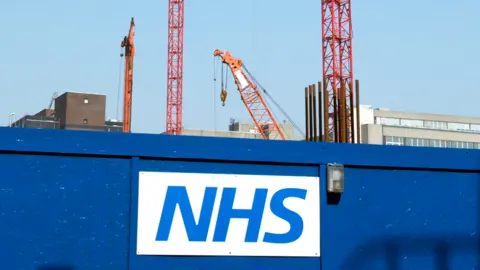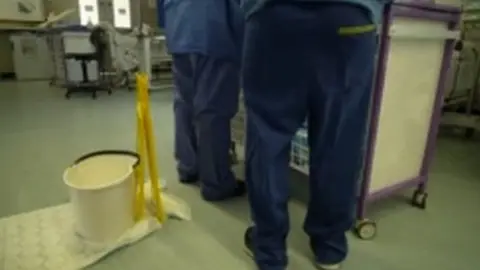Building work pending for many of 40 promised hospitals
 Getty Images
Getty ImagesBuilding work is yet to start for 33 of the government's 40 promised new hospitals in England, the BBC has found.
Most are still waiting to hear what their final budget will be for the projects with a 2030 deadline. Only two are finished and open.
Ministers aimed to have six ready for 2025 - but none of this group has full planning permission or funding yet.
The government insists it remains committed to meeting the targets.
"We are developing a new national approach to constructing hospitals so they can be built more rapidly, ensure value for money, and we continue to work closely with all trusts on their plans," an official said.
Health leaders say they need urgent clarity.
The BBC looked at the issue last year and since then there has been little progress.
When the pledge was announced, in 2019, there was some controversy about exactly what counts as a "new hospital".
NHS guidance says it can range from an entirely new building on a new site to a major refurbishment or alteration.
By October 2020, the commitment was confirmed, with an initial budget of £3.7bn.
Of the 40 hospitals on the list, eight were projects already planned.
BBC News contacted them all, asking for a progress report:
- 33 said they had not started the main building work yet
- Five are under construction
- Two, the Royal Liverpool and the Northern Centre for Cancer Care, are finished and open to patients
Investment seems to be a factor:
- Eight said they had full funding
- One hospital did not want to answer
- 31 said they did not yet have the money to start the core building work but had received some cash to get the project going
One of the six due to be completed in 2025 is Epsom and St Helier University Hospitals NHS Trust, near London.
Some parts of St Helier's site look more like a derelict building than a functioning NHS hospital.
A makeshift wooden roof at the back is held down with sandbags.
One of the three intensive-care units has a problem with ventilation, so it can be used only as a storeroom.
 BBC News
BBC NewsIn another, staff are working around a leak.
In winter, it is not unusual for entire corridors to flood.
When we met Chief Medical Officer Ruth Charlton outside a condemned ward, she told us: "It's not safe to enter - the foundations are crumbling and windows are falling out."
She cannot see a new build happening by 2025. Her "optimistic" estimate is 2027. Ms Charlton would not be drawn on a realistic guess but was blunt about how sad and frustrated she felt.
"I'm frustrated on behalf of our patients, their families or staff that they can't receive healthcare in the sort of facility that I would want my family to receive healthcare in," she told us.
As we talk, we can hear the sound of a maintenance crew drilling.
The trust says its backlog maintenance - to bring buildings and equipment up to standard - will cost £130m.
'Extremely unlikely'
Across the NHS in England, backlog-maintenance costs have more than doubled, from £4.7bn in 2011-12 to £10.2bn in 2021-22.
In other words, it has become twice as expensive just to keep the doors open.
Health think tank the Nuffield Trust chief executive Nigel Edwards says the government started with a "big and slightly vague promise - and it was never clear there was enough money available to do anything like the scale of construction that they wanted to". And ministers hitting their 2030 target is "extremely unlikely".
"They've underestimated how long it takes to change the way they design, build, and plan hospitals," he says.
"It's a great ambition - but I think a bit of realism is now starting to sink in."
'Spend more'
In 2019, Boris Johnson assured voters he could build the 40 new hospitals but only "because we're running a strong economy".
The government has never explicitly allocated a budget for this project - but it has undoubtedly become more expensive.
Inflation means prices have gone up sharply, especially in construction.
Institute for Financial Studies senior research economist Ben Zaranko says: "Either the government sticks to that pledge and accepts it will need to spend more on hospital building or it decides it scales back the number and scope of hospitals."
A Department of Health and Social Care official said: "We remain committed to delivering all 40 new hospitals by 2030 as part of the biggest hospital-building programme in a generation."
'Critical level'
The logic here is the New Hospital Programme is developing a new national approach to building these hospitals across England - and a standard approach should mean more a rapid process.
But there is another - potentially dangerous - complication. Several hospitals across England are at risk of collapse, with roofs propped up with scaffolding and posts, because they were built using reinforced autoclaved aerated concrete (RAAC) - a lightweight concrete with bubbles inside like "a chocolate Aero bar".
The NHS has identified 34 NHS buildings in England containing RAAC planks - and it is believed about five need to be dealt with urgently.
But only a small number of the hospitals with planned new builds are thought to be affected by RAAC, so it would make sense to expect new RAAC hospitals to be added to the list soon.
A Department of Health and Social Care official said: "We remain committed to delivering all 40 new hospitals by 2030 as part of the biggest hospital-building programme in a generation."
"We are developing a new national approach to constructing hospitals so they can be built more rapidly, ensure value for money, and we continue to work closely with all trusts on their plans."
Sir Julian Hartley, chief executive of NHS Providers, which represents trusts, wants clarity, ideally in the next few weeks.
"We are at a pivotal moment, a key point, where we cannot leave for much longer the scale of deterioration," he says.
'We need to know that if we delay too much longer, the scale of the problems in other hospitals and facilities will get to a critical level."
Speaking to BBC Radio 4's Today programme, he added there was an "absolutely dire need for decisions to be made about making progress... and tackling in the longer term the ageing infrastructure" of hospitals.
